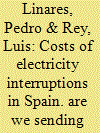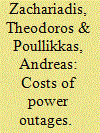|
|
|
Sort Order |
|
|
|
Items / Page
|
|
|
|
|
|
|
| Srl | Item |
| 1 |
ID:
110722


|
|
|
|
|
| Publication |
2011.
|
| Summary/Abstract |
The objective of this paper is to contribute to the topic of energy supply security by proposing a Monte Carlo-based and a survey based model to analyze the costs of power interruptions. Outage cost estimations are particularly important when deciding on investments to improve supply security (e.g. additional transmission lines) in order to compare costs to benefits. But also other policy decisions on measures that have direct or indirect consequences for the supply security (e.g. a phasing out of nuclear energy) need to be based on results from outage cost estimations. The main focus of this paper lies with residential consumers, but the model is applied to commercial, industrial and governmental consumers as well. There are limited studies that have approached the problem of evaluating outage cost. When comparing the results of these studies, they often display a high degree of diversification. As consumers have different needs and dependencies towards the supply of electricity because of varying circumstances and preferences, a great diversity in outage cost is a logical consequence. To take the high degree of uncertainties into account, a Monte Carlo simulation was conducted in this study for the case of private households in Germany.
|
|
|
|
|
|
|
|
|
|
|
|
|
|
|
|
| 2 |
ID:
112897


|
|
|
|
|
| Publication |
2012.
|
| Summary/Abstract |
This paper investigates the economic implications of disruptions of one to ninety days to the supply of natural gas in Ireland. We assess the impact of a hypothetical gas supply disruption in both winter and summer in 2008 (with observed market characteristics) and in 2020 (with projected market characteristics). The cost of a natural gas outage includes the cost of natural gas being unavailable for heating and other purposes in the industrial and commercial sectors, lost consumer surplus in the residential sector, the cost of lost electricity in all sectors and lost VAT on the sale of gas and electricity. Ireland generates much of its electricity from natural gas and the loss of this electricity accounts for the majority of the cost of a natural gas outage. Losing gas-fired electricity would cost 0.1-1.0 billion euro per day, depending on the time to the week, the time of year and rationing. Industry should be rationed before households to minimise economic losses, but current emergency protocols do the opposite. If gas-fired electricity is unavailable for three months, the economic loss could be up to 80 billion euro, about half of Gross Domestic Product. Losing gas for heating too would add up to approximately 8 billion euro in economic losses. We also discuss some options to increase Ireland's security of supply, and find that the cost is a small fraction of the avoided maximum damage.
|
|
|
|
|
|
|
|
|
|
|
|
|
|
|
|
| 3 |
ID:
125570


|
|
|
|
|
| Publication |
2013.
|
| Summary/Abstract |
One of the objectives of energy security is the uninterrupted physical availability of energy. However, there is limited information about how much is the cost of energy supply interruptions. This information is essential to optimize investment and operating decisions to prevent energy shortages, or, alternatively, to determine the strength of the signals to be sent to the agents so that they may invest accordingly. In this paper, we estimate the economic impact of an electricity interruption in different sectors and regions of Spain. Although there are several caveats in our analysis, we find that in 2008 the cost for the Spanish economy of one kWh of electricity not supplied was above €4 even in a conservative scenario, which is higher than the signals currently being sent as incentives to avoid these interruptions. This might result in an underinvestment in short-term energy security, particularly when we add the usual risk aversion of most consumers.
|
|
|
|
|
|
|
|
|
|
|
|
|
|
|
|
| 4 |
ID:
116982


|
|
|
|
|
| Publication |
2012.
|
| Summary/Abstract |
We study the costs of electricity disruptions in Cyprus, which suffered severe power shortages in summer 2011 after an explosion that destroyed 60% of its power generating capacity. We employ both economic and engineering approaches to assess these costs. Among other calculations, we provide estimates of the value of lost load by economic sector and the hourly value of electricity by season and type of day. The results of two economic methods employed to assess welfare losses differ largely, indicating that the assessment of outage costs is associated with many uncertainties. Our calculations show that the emergency actions taken by national energy authorities in response to that accident, though not necessarily optimal, have generally been appropriate and in line with international best practices: the additional costs incurred due to these measures are lower than the economic losses avoided thanks to these actions. Preferential treatment of specific consumer types in the case of repeated power outages remains an open policy question.
|
|
|
|
|
|
|
|
|
|
|
|
|
|
|
|
| 5 |
ID:
103446


|
|
|
|
|
| Publication |
2011.
|
| Summary/Abstract |
This paper estimates the value of short term lost load in the all island electricity market, which includes the Republic of Ireland and Northern Ireland. The value of lost load (VoLL) is the average willingness of electricity consumers to pay to avoid an additional period without power. VoLL is also known as the value of security of electricity supply and is inferred using a production function approach. Detailed electricity use data for the Republic of Ireland allows us to estimate the value of lost load by time of day, time of week and type of user. We find that the value of lost load is highest in the residential sector in both the Republic of Ireland and Northern Ireland. Our results can be used to advise policy decisions in the case of supply outages and to encourage optimum supply security. In the context of this study short term is taken to be a matter of hours rather than days or weeks.
|
|
|
|
|
|
|
|
|
|
|
|
|
|
|
|
| 6 |
ID:
166936


|
|
|
|
|
| Summary/Abstract |
The value of lost load (VOLL) is an essential parameter for power system reliability. It represents the cost of unserved energy during power interruptions. Various studies have estimated this parameter for different countries and more recently, for different interruption characteristics – such as interruption duration, time of interruption and interrupted consumer. However, it is common practice in system operation and the literature to use only one uniform VOLL. Our theoretical analysis shows that using more-detailed VOLL data leads to more cost-effective transmission reliability decisions. Using actual consumer- and time-differentiated VOLL data from Norway, Great Britain and the United States, numerical simulations of short-term power system reliability management indicate a potential operational cost decrease of up to 43% in a five-node network, and between 2% and 18% in a more realistic 118-node network – mainly because of lower preventive redispatch costs in response to lower expected interruption costs. However, changed reliability practices could lead to opposition, if some consumers are disproportionately interrupted and not adequately compensated. Although the first policy measures to collect more detailed and harmonized VOLL data have been taken, future policy should improve transmission-distribution coordination and enable the participation of all consumers in curtailment programs, through smart meters and smart appliances.
|
|
|
|
|
|
|
|
|
|
|
|
|
|
|
|
| 7 |
ID:
116725


|
|
|
|
|
| Publication |
2012.
|
| Summary/Abstract |
The paper focuses on the evaluation of the economic losses in the industrial sector due to a lack of power quality. The term power quality includes, in general, a set of boundary conditions which allow electrical systems connected to the grid to function as planned. Therefore, the operation of the power system outside these boundaries directly impacts on the economic performance of the whole system. The evaluation of the economical loses derived from this fact has been the subject of several studies, mostly applied to individual cases, with calculation methodologies either too complicated to be applicable, needing a large input of data, mostly dealing with confidentiality issues, or based on particular cases and impossible to extrapolate. The objective of this paper is provide decision makers and authorities responsible of enforcing compensations for losses derived of power quality issues with a relatively easy to apply methodology for calculating the real quantity of these losses. An example of the application of this methodology and an analysis of the results is also provided. The validation of the methodology and its use for different comparison analysis was also carried out. Conclusions are given at the end of the work and further research is proposed.
|
|
|
|
|
|
|
|
|
|
|
|
|
|
|
|
|
|
|
|
|